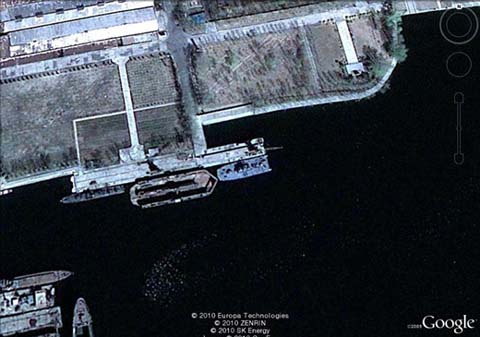According to the Daily NK:
The 1718 Committee of the UN Security Council has published the final version of its “Report to the Security Council from the Panel of Experts established Pursuant to Resolution 1874,”
In the report, of which the Daily NK has obtained a copy, the 1718 Committee revealed North Korean overseas accounts which had likely been used for North Korea’s illicit activities such as conventional weapons transactions and luxury goods, and the names of entities and individuals involved in those activities. The lists were submitted by UN member states.
The report singles out 17 North Korean officials thought likely to violate UN Resolutions 1718 and 1874, and outlines the reasons why they were designated by the UN member states.
They are Jang Sung Taek, Vice-chairman of the National Defense Commission and the closest associate of Kim Jong Il, Vice-chairman of the National Defense Commission Oh Keuk Ryul, Kim Young Chun, the Minister for the People’s Armed Forces, Director of No. 39 Department Kim Dong Woon, Military Supplies Secretary in the Central Committee of the Party Jeon Byung Ho, former Yongbyon technical director Jeon Chi Bu, First Vice-director of the Ministry of the Munitions Industry Chu Kyu Chang, Standing Vice-director of the People’s Army’s General Political Department Hyun Cheul Hae, President of the Tanchon Commercial Bank Kim Dong Myung, Member of the National Defence Commission Baek Se Bong, Deputy Director of the General Political Department of the People’s Armed Forces Park Jae Kyung, President of the Academy of Science Byeon Youong Rip, Director of the General Bureau of Atomic Energy Ryeom Young, Head of the Department of Nuclear Physics of Kim Il Sung University Seo Sang Il, President of Kohas AG Jacop Steiger and Alex H.T. Tsai, who is known to have provided financial, technological and other support for KOMID, and his wife, Su Lu-chi.
It also released a list of autonomous designations provided by member states, covering 19 North Korean entities. That list was made based on information collected as of April 30th this year.
They are Amroggang Development Banking Corporation, Global Interface Company Inc., Hesong Trading Corporation, Korea Complex Equipment Import Corporation, Kohas AG, Korea International Chemical Joint Venture Company, Korea Kwangson Banking Corp, Korea Kwangsong Trading Corporation, Korea Pugang Trading Corporation, Korea Pugang Mining and Machinery Corporation ltd., Korea Ryongwang Trading Corporation, Korea Ryonha Machinery Joint Venture Corporation, Korea Tonghae Shipping Company, Ponghwa Hospital, Pyongyang Informatics Centre, Sobaeku United Corp., Tosong Technology Trading Corporation, Trans Merits Co. Ltd., and Yongbyon Nuclear Research Centre.
13 out of the 19 have direct or indirect links to Tanchon Commercial Bank and Korea Mining Development Trading Corporation (KOMID).
Amroggang Development Banking Corporation is the financial arm of KOMID and related to Tanchon Commercial Bank, which has also been designated by the 1718 Committee. Additionally, Global Interface Company Inc. is owned by Alex Tsai, who is thought to have provided, or attempted to provide, support to KOMID.
Sobaeku United Corp. is involved in activities related to natural graphite, producing graphite blocks that can be used in missiles.
The report points out, “North Korea has established a highly sophisticated international network for the acquisition, marketing and sale of arms and military equipment, and arms exports have become one of the country’s principal sources for obtaining foreign exchange,” and goes on to say, “Agencies under the National Defense Commission (NDC), the Workers’ Party of Korea (WPK) and the Korean People’s Army (KPA) are most active in this regard.”
The report explains, “The Second Economic Committee of the National Defense Commission plays the largest and most prominent role in nuclear, other WMD and missile-related development programs as well as in arranging and conducting arms-related exports.”
It adds, “The General Bureau of Surveillance of the Korean People’s Army is involved in the production and sale of conventional armaments.”
The report points out that North Korea has opened 39 accounts with 18 overseas banks in 14 countries. 17 of which are held with Chinese banks.
Besides China, 11 banks in eight European and former Soviet countries (Russia, Switzerland, Denmark, Hungary, Poland, Italy, German, Belarus and Kazakhstan) hold 18 North Korean accounts. There is one account in Malaysia.
“The DPRK also employs a broad range of techniques to mask its financial transactions, including the use of overseas entities, shell companies, informal transfer mechanisms, cash couriers and barter arrangements,” the report notes.
According to experts on North Korea, since North Korean overseas illegal activities are all led by the loyal group surrounding Kim Jong Il, U.S. financial sanctions in accordance with UN Security Council resolutions 1817 and 1874 and also U.S. Executive Order (E.O.) 13382 have the potential to be a great pressure on the Kim Jong Il regime.
The Panel of Experts, which was appointed by the UN Secretary-General on 12 August 2009 to author the report, are David J. Birch (United Kingdom of Great Britain and Northern Ireland, coordinator), Masahiko Asada (Japan), Victor D. Comras (United States of America), Erik Marzolf (France), Young Wan Song (Republic of Korea), Alexander Vilnin (Russian Federation), and Xiaodong Xue (People’s Republic of China).
Read the full story here:
Report Explains Sanctions Decisions
Daily NK
Kim Yong Hun
8/6/2010

